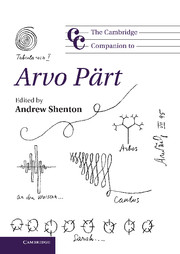Book contents
- Frontmatter
- 1 Introduction: the essential and phenomenal Arvo Pärt
- 2 A narrow path to the truth: Arvo Pärt and the 1960s and 1970s in Soviet Estonia
- 3 Perspectives on Arvo Pärt after 1980
- 4 Musical archetypes: the basic elements of the tintinnabuli style
- 5 Analyzing Pärt
- 6 Arvo Pärt: in his own words
- 7 Bells as inspiration for tintinnabulation
- 8 Arvo Pärt and spirituality
- 9 The minimalism of Arvo Pärt: an ‘antidote’ to modernism and multiplicity?
- 10 Arvo Pärt in the marketplace
- Appendix A Radiating from silence: the works of Arvo Pärt seen through a musician's eyes
- Appendix B Greatly sensitive: Alfred Schnittke in Tallinn
- Appendix C Remembering Heino Eller
- Appendix D Acceptance speech for the International Bridge Prize of the European City of Görlitz
- Appendix E Acceptance speech for the Léonie Sonning Music Prize 2008
- Appendix F Works list
- Notes
- Select bibliography
- Cambridge Companions to Music
- Index
Appendix E - Acceptance speech for the Léonie Sonning Music Prize 2008
Published online by Cambridge University Press: 28 September 2012
- Frontmatter
- 1 Introduction: the essential and phenomenal Arvo Pärt
- 2 A narrow path to the truth: Arvo Pärt and the 1960s and 1970s in Soviet Estonia
- 3 Perspectives on Arvo Pärt after 1980
- 4 Musical archetypes: the basic elements of the tintinnabuli style
- 5 Analyzing Pärt
- 6 Arvo Pärt: in his own words
- 7 Bells as inspiration for tintinnabulation
- 8 Arvo Pärt and spirituality
- 9 The minimalism of Arvo Pärt: an ‘antidote’ to modernism and multiplicity?
- 10 Arvo Pärt in the marketplace
- Appendix A Radiating from silence: the works of Arvo Pärt seen through a musician's eyes
- Appendix B Greatly sensitive: Alfred Schnittke in Tallinn
- Appendix C Remembering Heino Eller
- Appendix D Acceptance speech for the International Bridge Prize of the European City of Görlitz
- Appendix E Acceptance speech for the Léonie Sonning Music Prize 2008
- Appendix F Works list
- Notes
- Select bibliography
- Cambridge Companions to Music
- Index
Summary
May 22, 2008, in Copenhagen, Denmark.
Distinguished members of the Award Committee, dear friends,
We have to admit: Human beings are imperfect. There is no other knowledge that people have a harder time accepting. Maybe some people think a composer is the exception. I have to tell you: no, he isn't … unfortunately.
In allusion to Pontius Pilate's famous question we ask: But what is perfection? What if we actually knew the answer, would it help us? At first, at least, it might seem that the idea of perfection has no place in our daily life. Somehow it is not current, not relevant. In an artist's creative process, however, this eternal question turns up to its fullest extent. It doesn't leave the creative person in peace. It worries and plagues him, because he strives for perfection with his whole physical and mental being. He searches for it almost to the point of desperation.
Yet very oft en his goals by far surmount his possibilities, and the huge gap between them painfully shows him his limits. These extreme efforts sometimes lead to a result that exceeds the author's measure and the limits of his potential. And there something happens that does not adhere to the laws of logic: A work of art liberates itself from its intrinsically unfavorable preconditions.
- Type
- Chapter
- Information
- The Cambridge Companion to Arvo Pärt , pp. 202Publisher: Cambridge University PressPrint publication year: 2012

